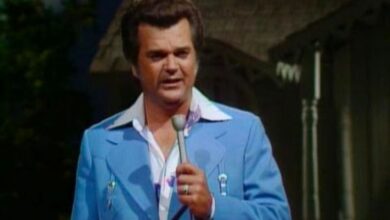Rediscovering the Timeless Appeal of Merle Haggard’s ‘Sing Me Back Home’
Merle Haggard’s “Sing Me Back Home” is not just a song; it’s a heartfelt narrative steeped in melancholy and longing. Released in 1967, the song is widely considered one of Haggard’s finest works and a testament to his storytelling prowess. With its poignant lyrics and evocative melody, “Sing Me Back Home” paints a vivid picture of a man on death row, yearning for one last connection to the life he once knew.
The song was inspired by Haggard’s own experiences in San Quentin State Prison, where he served time for burglary in the late 1950s. The titular refrain, “sing me back home before I die,” is a plea from a condemned prisoner to an old friend, asking to be sung a last song that would evoke memories of a time when they were free. The lyrics are both haunting and empathetic, highlighting Haggard’s ability to transform his own personal history into universally resonant music.
The compelling narrative of “Sing Me Back Home” is further bolstered by its melodic composition. Haggard’s mournful vocals are perfectly complemented by a slow, melancholic country tune. The poignant strums of the guitar, coupled with the gentle twang of the pedal steel, create an atmosphere of somber reflection. This perfectly captures the mood of the song’s protagonist, evoking a sense of nostalgia and heartbreaking inevitability.
Haggard’s performance of “Sing Me Back Home” is also worth noting. His voice, imbued with a raw honesty, brings the song’s subject to life. It’s clear that this is a personal story for Haggard, and his authentic delivery makes the narrative all the more compelling. He doesn’t just sing the lyrics; he lives them, pulling the listener into the stark reality of the protagonist’s situation.
“Sing Me Back Home” was the title track of Haggard’s 1968 album and became one of his most successful singles, reaching number one on the Billboard country charts. The song’s success cemented Haggard’s status as a leading figure in the Bakersfield Sound, a raw and gritty style of country music that stood in stark contrast to the polished Nashville sound of the era.
In conclusion, “Sing Me Back Home” is more than just a country song; it’s a powerful piece of storytelling that offers a glimpse into the harsh realities of prison life. Merle Haggard’s masterful blend of poignant lyrics, evocative melody, and heartfelt performance make this track a benchmark in his prolific career. The song remains a testament to Haggard’s ability to turn personal tribulations into moving, universally relatable music.





